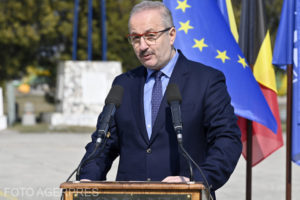The international community has firmly condemned the invasion of Ukraine by Russian troops, which triggered the most severe refugee crisis in Europe since World War II.
It is precisely the fallout of this military aggression and the Allied efforts to manage it and to come up with an appropriate response that was in the focus of Monday’s telephone talks between the Romanian foreign minister Bogdan Aurescu and the US secretary of state Antony Blinken.
The two officials discussed concrete ways to provide support to Ukraine, and a number of bilateral cooperation elements as part of the Romania – US Strategic Partnership. Bogdan Aurescu presented Bucharest’s assessments of the security developments on NATO’s eastern flank and in the Black Sea region. He also detailed the complex measures taken by Romanian authorities to support neighbouring Ukraine at a political, logistic, and humanitarian level.
The Romanian diplomacy chief emphasised the importance of quickly implementing the decisions made at NATO’s summit on March 24, particularly establishing as soon as possible the Romania battle group, as a first step in balancing and consolidating NATO’s presence on the eastern flank in the long run.
On the other hand, he presented the needs of Romania’s eastern neighbour, the Republic of Moldova, in handling the crisis entailed by Russia’s military aggression in Ukraine and strengthening this country’s resilience.
In turn, state secretary Antony Blinken thanked Romania on behalf of the US for the regional role that Bucharest has embraced and for the support given to Kyiv and other vulnerable partners in the region, including Chișinău. Moreover, Antony Blinken appreciated Romania’s steadfast commitment, as a strategic partner of the USA and a reliable and trustworthy NATO Ally, to stability and security in the Black Sea region and at European and Euro-Atlantic level.
The US official also reaffirmed Washington’s full commitment to protecting the territories of Romania and of all Allied states, especially those in the frontline.
Also on Monday, the Romanian defence minister Vasile Dîncu talked over the phone with his US counterpart, Lloyd Austin, about security developments in the Black Sea region, in the context of the war in Ukraine, as well as about the stage of setting up the Allied battle group in Romania.
Vasile Dîncu thanked the US for the commitment and substantial contribution to ensuring security on NATO’s eastern flank. Relocating the Stryker combat team, deploying F-16 and F-18 aircraft to reinforce air policing missions in Romania are just two concrete examples of a solid trans-Atlantic relationship.
Leyla Cheamil, Radio Romania International









